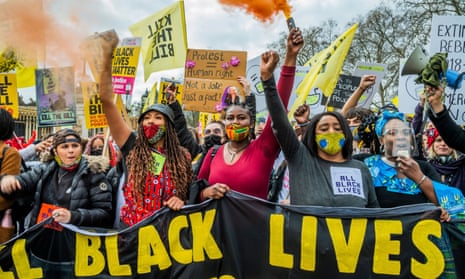A controversial report into racial disparities in the UK attempts to “normalise white supremacy” and the government should reject its findings, UN human rights experts have warned.
The report by the Commission on Race and Ethnic Disparities, published at the end of March, concluded that while racism and racial injustice still existed, geography, family influence, socioeconomic background, culture and religion all had a greater impact on life chances. The report said it did not find evidence of institutional racism in the areas it examined, such as policing and health.
In a statement, the the UN working group of experts on people of African descent said: “In 2021, it is stunning to read a report on race and ethnicity that repackages racist tropes and stereotypes into fact, twisting data and misapplying statistics and studies into conclusory findings and ad hominem attacks on people of African descent.”
The experts criticised the report’s focus on family structure to explain racial disparities, describing it as “a tone-deaf attempt at rejecting the lived realities of people of African descent and other ethnic minorities in the UK”. It said the report failed to provide any persuasive evidence for claims there was no institutional racism in the UK and instead cited dubious evidence.
“This attempt to normalise white supremacy despite considerable research and evidence of institutional racism is an unfortunate sidestepping of the opportunity to acknowledge the atrocities of the past and the contributions of all in order to move forward,” the statement added.
A spokesman for the prime minister said the UN body had misrepresented the findings of the commission.
The findings were also widely condemned by MPs, unions and equality campaigners as “divisive” and a missed opportunity for systemic change. Since its publication, at least 20 organisations and individuals who were listed as stakeholders in the report have distanced themselves from its findings.
The experts alleged the report omitted analysis of institutional racism by international human rights experts, including the UN working group of experts on people of African descent’s 2012 review after its country visit to the UK, the 2016 concluding observations of the committee on the elimination of racial discrimination, and the UN special rapporteur on contemporary forms of racism’s report following her 2018 visit to the UK.
The UN body called on the government to reject the report and urged it to ensure the “accurate reflection of historical facts”, adding: “The distortion and falsification of [these] historic facts may license further racism, the promotion of negative racial stereotypes, and racial discrimination.”
The review behind the report was set up by Downing Street to investigate racial disparities in the UK in response to the Black Lives Matter protests last summer.
In a foreword to the report, the commission’s chair, Dr Tony Sewell, said some communities were haunted by historical racism and there was a “reluctance to acknowledge that the UK had become open and fairer”. He said the review found some evidence of bias, but often it was a perception that the wider society could not be trusted.
The UN experts behind the statement are the chair, Dominique Day, Ahmed Reid, Michal Balcerzak, Sabelo Gumedze and Ricardo Sunga III. The statement was endorsed by E Tendayi Achiume, the UN special rapporteur on contemporary forms of racism.
The experts also criticised the report’s “mythical representation of enslavement” as an attempt to sanitise the history of the slave trade. In a statement released on 2 April, the commission rejected the “wilful misrepresentation” of its views on slavery and said the report “merely says that in the face of the inhumanity of slavery, African people preserved their humanity and culture”.
Boris Johnson’s official spokesperson said: “Our view is that this [UN] report misrepresents the findings. We remain proud of the UK’s long history as a human rights champion and we encourage everyone to read the original report in full. This report in no way condones racist behaviour and in fact it highlights that racism and inequality are still problems for our country.”
A spokesperson for the commission said: “We are disappointed that the working group of experts on people of African descent has grossly misrepresented the report’s findings, and appears to be a response to negative press coverage rather than the substance of its content.
“The misleading claims they have made risk fostering division on the subject of race, rather than constructive discussion on the issues.
“We urge the UK government to implement the 24 practical recommendations we have made. These will improve the lives of millions and help deliver a fairer society for all races and ethnicities in the UK.”
